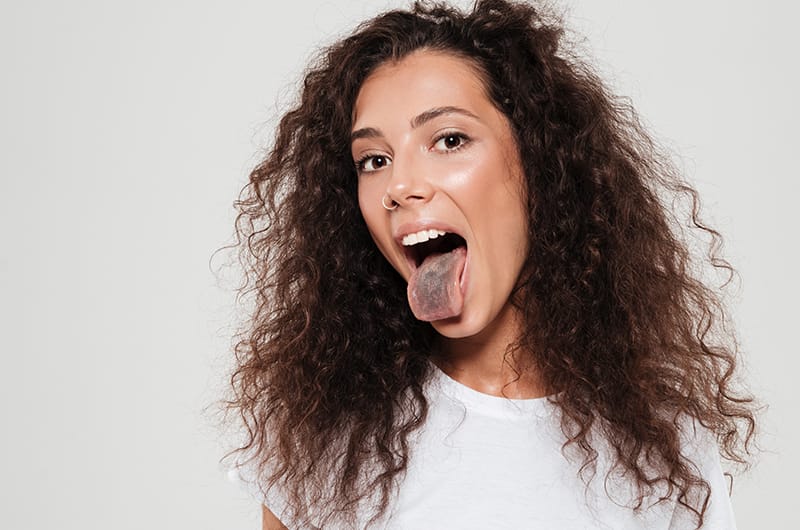Having an occasional black spot on your tongue that goes away with time is completely natural and harmless, as such spots can be caused by the foods and drinks we take in. Apart from such typical causes and tongue injuries, medical conditions can also create abnormal spots on your tongue, which can vary in color depending on the disease. Black hairy tongue, thrush, and geographic tongue are a few examples of conditions that can trigger black, grey, and red spots, respectively. When treating dark spots on your tongue, it’s best to practice basic oral hygiene like brushing your teeth and tongue and flossing regularly. This can help prevent discoloration in tongues as well. However, if you notice the growth of such spots into lumps that persist, you’ll need to get advice from your doctor.
A simple spot on our body can tell us a lot about our bodies. Even its colors could be significant in identifying various medical conditions.
While some spots may mean nothing, some can even be a way that our body hints at a dangerous disease. This applies to spots on any part of our body, including the tongue.
Most mouth-based medical conditions are caused due to lack of oral hygiene.
Maintaining proper oral hygiene can automatically get rid of such black spots despite their cause, unless in serious conditions like cancer and Leukoplakia.
Is it normal to have a black spot on your tongue? What medical conditions can cause spots on your tongue? What are other symptoms that you can expect from such diseases?
How can you treat black spots on your tongue and tongue discoloration? At what point should you see your doctor about black spots on your tongue?
Is it normal to have a black spot on your tongue?

If you’re a person that maintains oral health, it might shock you to suddenly notice blackish spots on your tongue.
However, in most cases, this is nothing to be worried about, as black spots can happen for natural and harmless reasons. The most natural cause of these black spots is our taste buds.
Our taste buds can be seen by our naked eye and may stand out as a result of coffee or red wine staining them.
So, when you drink a strong-colored drink, you can expect this discoloration in the form of a spot that will fade away with time.
Poor oral health too can cause such black spots as it triggers staining and discoloration.
If you don’t wash your mouth daily or brush your teeth, and if you smoke cigarettes, you may be prone to having black spots. You can easily erase such spots by practicing good oral hygiene.
Apart from these natural causes, tongue injuries can also harm your tongue in a way that leaves an unpleasant blackish sore on your tongue.
Tongue injuries mostly happen when it gets bitten and cut.
A tongue piercing is also a common cause of injury to the tongue that can trigger such black spots, according to the US National Library of Medicine.
What medical conditions can cause spots on your tongue?
Although spots and patches in your tongue are mostly nothing to be worried about, occasionally it could hint at a pre-existing medical condition.

The following list will clarify such health conditions along with other symptoms to be expected from those conditions:
- Black hairy tongue – This condition is triggered by an overgrowth of dead skin on your tongue. Prolonged stains from food substances, yeast, and bacteria too can cause this condition, resulting in harmless dark spots on your tongue.
- Leukoplakia – This is a condition in which white or grey spots occur on your tongue and is mostly identified with the use of tobacco. In a 2020 study conducted by the US National Library of Medicine, 85.1% of the patients were discovered to be active smokers. This isn’t entirely harmless like the black hairy tongue condition, as it runs the risk of gradually developing into oral cancer. Apart from the tongue, it can also form on your gums or cheeks.
- Geographic tongue – This condition occurs as a result of loss of papillae on the surface of our tongue. Papillae are small hair-like projections on our tongue, and without them, this condition can cause red patches of all shapes and sizes on our tongue. While this condition is harmless and might go away on its own, it can, in certain instances, cause inflammation and last for years.
- Thrush – This condition is caused by a fungal infection and can happen in your mouth, throat, and even other body areas. Your tongue may have white raised lesions which can easily get irritated and cause pain. According to a 2012 study conducted by the US National Library of Medicine, oral thrush is a common side effect of cancer treatments known as chemotherapy, which can damage your mucous membranes, allowing the fungus to spread easily.
- Tongue cancer – Cancer in your tongue might appear as a red or pink lump along the sides of your tongue margins. You might barely feel any pain when you touch it, and it doesn’t go away with time. If you notice such a spot, it’s important to get it checked immediately.
What other symptoms can you expect from such conditions?
The conditions listed above are the leading causes of spots on your tongue.
To easily identify the condition you’re facing, other symptoms are categorized accordingly in the table below.
| Black hairy tongue symptoms | Leukoplakia symptoms | Geographic tongue symptoms | Thrush symptoms | Tongue cancer symptoms |
|---|---|---|---|---|
| Tickling feeling on tongue | Red lesions on tongue | Constant change in size and shape of lesions | Difficulties in swallowing and eating | Pain when swallowing food or water |
| Burning sensation on roof of mouth | Lesion areas will be hard or thick | The location of your lesion might shift | Loss of taste | Feeling numbness in mouth |
| Bad breath | Flat-textured lesions | Can notice lack of papillae on tongue | Bleeding and redness of tongue | Burning sensation on your tongue |
| Metallic taste in mouth | Patches that cannot be wiped away | Burning sensation when eating spice or hot food | Can experience soreness and dryness in tongue | A sore throat that doesn’t go away with time |
How to treat tongue discoloration and black spots?
Engaging in proper oral hygiene is not only the best way to treat the black spot on your tongue but also the only way.

By following the steps given below, you can ensure the gradual disappearance of the dark spots.
- Brush after eating – You need to brush your teeth about twice a day to maintain ideal oral hygiene. Taking extra precautions and brushing after every meal will leave no space for stains on your tongue.
- Brush your tongue – Brushing only your teeth is not enough as the source of the problem lies in your tongue. To remove any collected food debris, bacteria, and dead cells, you’ll need to gently brush your tongue as well. Tongue scrapers also fulfill this purpose.
- Have a balanced diet – Balanced diets are essential for oral health as nutritious fresh fruits and vegetables provide nutrients to our teeth and gums in fighting bacteria and infections. Drinking lots of water will also help wash down food stains from your tongue.
- Visiting your dentist – If you’re facing symptoms of poor oral hygiene, visiting your dentist would help a lot. Since dentists can easily spot any oral problems at an early stage itself, they can help you prevent further harm to your oral health.
- Avoiding triggers – By avoiding substances such as tobacco and minimizing alcohol usage, you can control and prevent the staining on your tongue. You can also take a step further and be cautious about the mouthwash that you use, as irritating mouthwashes can trigger the situation.
- Dental flossing – Flossing at least once a day can help keep collected food particles away from your teeth.
At what point should you see a doctor?
As we already know, medical conditions like black hairy tongue and geographic tongue go away on their own. It may gradually go down with time or with the practice of oral hygienic habits.
If you’re an active smoker and lead a sedentary lifestyle, the chances are you don’t need a doctor to get rid of the dark spots. You’ll need to eliminate smoking and drinking too much alcohol.
The little to no consumption of healthy foods can also influence the dark spot stains on your tongue negatively.
If such is the case, you can take measures on your own to remedy the situation without the aid of a doctor.
Eating a well-balanced diet, increasing your fruit and vegetable intake, and always staying hydrated can create a healthy mouth and can even prevent oral cancer in the long run.
However, if your patches don’t seem to go away with time and have developed into lesions that are numb and don’t budge in shape or size, chances are that you’re looking at something more serious than a dark spot.
If you’re experiencing a sore lip or mouth that doesn’t heal, loose teeth, mouth pain along with ear pain, or any difficulties or pain in swallowing, it’s best to schedule an appointment with your doctor as it may be a sign of mouth cancer.
Conclusion
If you’re suffering from the most common condition known as black hairy tongue or tongue discoloration, or even other conditions caused by bacterial infections, your first and foremost consideration needs to be including good oral hygiene practices as patients who have had hairy tongue are facing a greater risk of recurrence according to the American Academy of Oral Medicine.
Therefore the best long-term remedy you can resort to is the daily brushing of your teeth or using a tongue scraper.
It’ll not only help you get rid of your black spot, but it will also help you notice if your spots are from some other underlying medical condition. This way, you can get the medical help you need as soon as possible.


